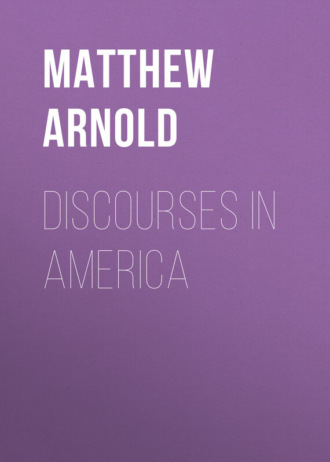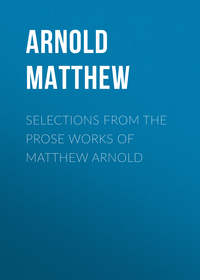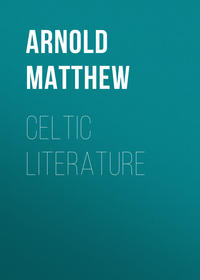 полная версия
полная версияDiscourses in America
This is tonic indeed! And let no one object that it is too general; that more practical, positive direction is what we want; that Emerson’s optimism, self-reliance, and indifference to favourable conditions for our life and growth have in them something of danger. ‘Trust thyself;’ ‘what attracts my attention shall have it;’ ‘though thou shouldst walk the world over thou shalt not be able to find a condition inopportune or ignoble;’ ‘what we call vulgar society is that society whose poetry is not yet written, but which you shall presently make as enviable and renowned as any.’ With maxims like these, we surely, it may be said, run some risk of being made too well satisfied with our own actual self and state, however crude and imperfect they may be. ‘Trust thyself?’ It may be said that the common American or Englishman is more than enough disposed already to trust himself. I often reply, when our sectarians are praised for following conscience: Our people are very good in following their conscience; where they are not so good is in ascertaining whether their conscience tells them right. ‘What attracts my attention shall have it?’ Well, that is our people’s plea when they run after the Salvation Army, and desire Messrs. Moody and Sankey. ‘Thou shalt not be able to find a condition inopportune or ignoble?’ But think of the turn of the good people of our race for producing a life of hideousness and immense ennui; think of that specimen of your own New England life which Mr. Howells gives us in one of his charming stories which I was reading lately; think of the life of that ragged New England farm in the Lady of the Aroostook; think of Deacon Blood, and Aunt Maria, and the straight-backed chairs with black horse-hair seats, and Ezra Perkins with perfect self-reliance depositing his travellers in the snow! I can truly say that in the little which I have seen of the life of New England, I am more struck with what has been achieved than with the crudeness and failure. But no doubt there is still a great deal of crudeness also. Your own novelists say there is, and I suppose they say true. In the New England, as in the Old, our people have to learn, I suppose, not that their modes of life are beautiful and excellent already; they have rather to learn that they must transform them.
To adopt this line of objection to Emerson’s deliverances would, however, be unjust. In the first place, Emerson’s points are in themselves true, if understood in a certain high sense; they are true and fruitful. And the right work to be done, at the hour when he appeared, was to affirm them generally and absolutely. Only thus could he break through the hard and fast barrier of narrow, fixed ideas, which he found confronting him, and win an entrance for new ideas. Had he attempted developments which may now strike us as expedient, he would have excited fierce antagonism, and probably effected little or nothing. The time might come for doing other work later, but the work which Emerson did was the right work to be done then.
In the second place, strong as was Emerson’s optimism, and unconquerable as was his belief in a good result to emerge from all which he saw going on around him, no misanthropical satirist ever saw shortcomings and absurdities more clearly than he did, or exposed them more courageously. When he sees ‘the meanness,’ as he calls it, ‘of American politics,’ he congratulates Washington on being ‘long already happily dead,’ on being ‘wrapt in his shroud and for ever safe.’ With how firm a touch he delineates the faults of your two great political parties of forty years ago! The Democrats, he says, ‘have not at heart the ends which give to the name of democracy what hope and virtue are in it. The spirit of our American radicalism is destructive and aimless; it is not loving; it has no ulterior and divine ends, but is destructive only out of hatred and selfishness. On the other side, the conservative party, composed of the most moderate, able, and cultivated part of the population, is timid, and merely defensive of property. It vindicates no right, it aspires to no real good, it brands no crime, it proposes no generous policy. From neither party, when in power, has the world any benefit to expect in science, art, or humanity, at all commensurate with the resources of the nation.’ Then with what subtle though kindly irony he follows the gradual withdrawal in New England, in the last half century, of tender consciences from the social organisations, – the bent for experiments such as that of Brook Farm and the like, – follows it in all its ‘dissidence of dissent and Protestantism of the Protestant religion!’ He even loves to rally the New Englander on his philanthropical activity, and to find his beneficence and its institutions a bore! ‘Your miscellaneous popular charities, the education at college of fools, the building of meeting-houses to the vain end to which many of these now stand, alms to sots, and the thousand-fold relief societies, – though I confess with shame that I sometimes succumb and give the dollar, yet it is a wicked dollar, which by and by I shall have the manhood to withhold.’ ‘Our Sunday schools and churches and pauper societies are yokes to the neck. We pain ourselves to please nobody. There are natural ways of arriving at the same ends at which these aim, but do not arrive.’ ‘Nature does not like our benevolence or our learning much better than she likes our frauds and wars. When we come out of the caucus, or the bank, or the Abolition convention, or the Temperance meeting, or the Transcendental club, into the fields and woods, she says to us: “So hot, my little sir?”’
Yes, truly, his insight is admirable; his truth is precious. Yet the secret of his effect is not even in these; it is in his temper. It is in the hopeful, serene, beautiful temper wherewith these, in Emerson, are indissolubly joined; in which they work, and have their being. He says himself: ‘We judge of a man’s wisdom by his hope, knowing that the perception of the inexhaustibleness of nature is an immortal youth.’ If this be so, how wise is Emerson! for never had man such a sense of the inexhaustibleness of nature, and such hope. It was the ground of his being; it never failed him. Even when he is sadly avowing the imperfection of his literary power and resources, lamenting his fumbling fingers and stammering tongue, he adds: ‘Yet, as I tell you, I am very easy in my mind and never dream of suicide. My whole philosophy, which is very real, teaches acquiescence and optimism. Sure I am that the right word will be spoken, though I cut out my tongue.’ In his old age, with friends dying and life failing, his tone of cheerful, forward-looking hope is still the same. ‘A multitude of young men are growing up here of high promise, and I compare gladly the social poverty of my youth with the power on which these draw.’ His abiding word for us, the word by which being dead he yet speaks to us, is this: ‘That which befits us, embosomed in beauty and wonder as we are, is cheerfulness and courage, and the endeavour to realise our aspirations. Shall not the heart, which has received so much, trust the Power by which it lives?’
One can scarcely overrate the importance of thus holding fast to happiness and hope. It gives to Emerson’s work an invaluable virtue. As Wordsworth’s poetry is, in my judgment, the most important work done in verse, in our language, during the present century, so Emerson’s Essays are, I think, the most important work done in prose. His work is more important than Carlyle’s. Let us be just to Carlyle, provoking though he often is. Not only has he that genius of his which makes Emerson say truly of his letters, that ‘they savour always of eternity.’ More than this may be said of him. The scope and upshot of his teaching are true; ‘his guiding genius,’ to quote Emerson again, is really ‘his moral sense, his perception of the sole importance of truth and justice.’ But consider Carlyle’s temper, as we have been considering Emerson’s! take his own account of it! ‘Perhaps London is the proper place for me after all, seeing all places are improper: who knows? Meanwhile, I lead a most dyspeptic, solitary, self-shrouded life; consuming, if possible in silence, my considerable daily allotment of pain; glad when any strength is left in me for writing, which is the only use I can see in myself, – too rare a case of late. The ground of my existence is black as death; too black, when all void too; but at times there paint themselves on it pictures of gold, and rainbow, and lightning; all the brighter for the black ground, I suppose. Withal, I am very much of a fool.’ – No, not a fool, but turbid and morbid, wilful and perverse. ‘We judge of a man’s wisdom by his hope.’
Carlyle’s perverse attitude towards happiness cuts him off from hope. He fiercely attacks the desire for happiness; his grand point in Sartor, his secret in which the soul may find rest, is that one shall cease to desire happiness, that one should learn to say to oneself: ‘What if thou wert born and predestined not to be happy, but to be unhappy!’ He is wrong; Saint Augustine is the better philosopher, who says: ‘Act we must in pursuance of what gives us most delight.’ Epictetus and Augustine can be severe moralists enough; but both of them know and frankly say that the desire for happiness is the root and ground of man’s being. Tell him and show him that he places his happiness wrong, that he seeks for delight where delight will never be really found; then you illumine and further him. But you only confuse him by telling him to cease to desire happiness; and you will not tell him this unless you are already confused yourself.
Carlyle preached the dignity of labour, the necessity of righteousness, the love of veracity, the hatred of shams. He is said by many people to be a great teacher, a great helper for us, because he does so. But what is the due and eternal result of labour, righteousness, veracity? – Happiness. And how are we drawn to them by one who, instead of making us feel that with them is happiness, tells us that perhaps we were predestined not to be happy but to be unhappy?
You will find, in especial, many earnest preachers of our popular religion to be fervent in their praise and admiration of Carlyle. His insistence on labour, righteousness, and veracity, pleases them; his contempt for happiness pleases them too. I read the other day a tract against smoking, although I do not happen to be a smoker myself. ‘Smoking,’ said the tract, ‘is liked because it gives agreeable sensations. Now it is a positive objection to a thing that it gives agreeable sensations. An earnest man will expressly avoid what gives agreeable sensations.’ Shortly afterwards I was inspecting a school, and I found the children reading a piece of poetry on the common theme that we are here to-day and gone to-morrow. I shall soon be gone, the speaker in this poem was made to say, —
‘And I shall be glad to go,For the world at best is a dreary place,And my life is getting low.’How usual a language of popular religion that is, on our side of the Atlantic at any rate! But then our popular religion, in disparaging happiness here below, knows very well what it is after. It has its eye on a happiness in a future life above the clouds, in the New Jerusalem, to be won by disliking and rejecting happiness here on earth. And so long as this ideal stands fast, it is very well. But for very many it now stands fast no longer; for Carlyle, at any rate, it had failed and vanished. Happiness in labour, righteousness, and veracity, – in the life of the spirit, – here was a gospel still for Carlyle to preach, and to help others by preaching. But he baffled them and himself by preferring the paradox that we are not born for happiness at all.
Happiness in labour, righteousness, and veracity; in all the life of the spirit; happiness and eternal hope; – that was Emerson’s gospel. I hear it said that Emerson was too sanguine; that the actual generation in America is not turning out so well as he expected. Very likely he was too sanguine as to the near future; in this country it is difficult not to be too sanguine. Very possibly the present generation may prove unworthy of his high hopes; even several generations succeeding this may prove unworthy of them. But by his conviction that in the life of the spirit is happiness, and by his hope that this life of the spirit will come more and more to be sanely understood, and to prevail, and to work for happiness, – by this conviction and hope Emerson was great, and he will surely prove in the end to have been right in them. In this country it is difficult, as I said, not to be sanguine. Very many of your writers are over-sanguine, and on the wrong grounds. But you have two men who in what they have written show their sanguineness in a line where courage and hope are just, where they are also infinitely important, but where they are not easy. The two men are Franklin and Emerson.5 These two are, I think, the most distinctively and honourably American of your writers; they are the most original and the most valuable. Wise men everywhere know that we must keep up our courage and hope; they know that hope is, as Wordsworth well says, —
‘The paramount duty which Heaven lays,For its own honour, on man’s suffering heart.’But the very word duty points to an effort and a struggle to maintain our hope unbroken. Franklin and Emerson maintained theirs with a convincing ease, an inspiring joy. Franklin’s confidence in the happiness with which industry, honesty, and economy will crown the life of this work-day world, is such that he runs over with felicity. With a like felicity does Emerson run over, when he contemplates the happiness eternally attached to the true life in the spirit. You cannot prize him too much, nor heed him too diligently. He has lessons for both the branches of our race. I figure him to my mind as visible upon earth still, as still standing here by Boston Bay, or at his own Concord, in his habit as he lived, but of heightened stature and shining feature, with one hand stretched out towards the East, to our laden and labouring England; the other towards the ever-growing West, to his own dearly-loved America, – ‘great, intelligent, sensual, avaricious America.’ To us he shows for guidance his lucid freedom, his cheerfulness and hope; to you his dignity, delicacy, serenity, elevation.
THE END1
Philippians, iv, 8.
2
Ὅσα σεμνά.
3
Ecclesiastes, viii. 17.
4
Iliad, xxiv. 49.
5
I found with pleasure that this conjunction of Emerson’s name with Franklin’s had already occurred to an accomplished writer and delightful man, a friend of Emerson, left almost the sole survivor, alas! of the famous literary generation of Boston, – Dr. Oliver Wendell Holmes. Dr. Holmes has kindly allowed me to print here the ingenious and interesting lines, hitherto unpublished, in which he speaks of Emerson thus: —
‘Where in the realm of thought, whose air is song,Does he, the Buddha of the West, belong?He seems a wingéd Franklin, sweetly wise,Born to unlock the secret of the skies;And which the nobler calling – if ’tis fairTerrestrial with celestial to compare —To guide the storm-cloud’s elemental flame,Or walk the chambers whence the lightning cameAmidst the sources of its subtile fire,And steal their effluence for his lips and lyre?’


